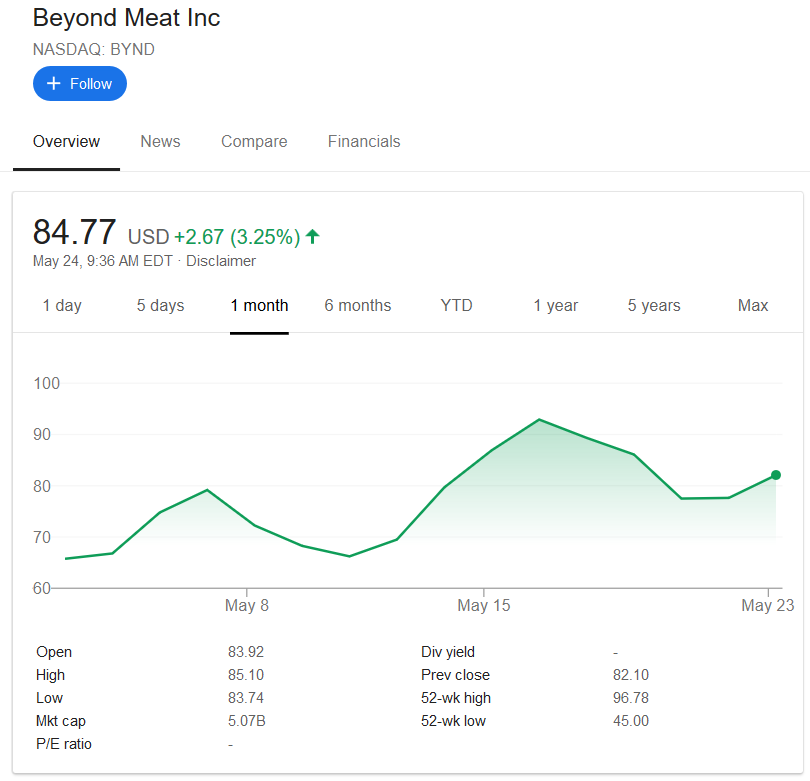I’m sure by now you’ve probably seen the news that Beyond Meat became the first vegan meat alternative brand to go public. If case you were not aware, you know I am a big proponent of finances and investing so I couldn’t help follow this news. (I also run Sisters for Financial Independence, a personal finance site dedicated to empowering women on the journey to financial independence. I am intrigued by how well the stock continues to trend following its Initial Public Offering (IPO) and of course a few questions started to pop into my mind as a someone who also values sustainability.
Beyond Meat stock price since IPO.
Some disclosures up front. I have only tried one Beyond Meat product, though I am now very curious to try their other “meats” out. I am not vegan or consider myself to be plant-rich, though I have goals to lean more towards a more plan rich diet, but my pregnancy has slowed that down a bit. This is also not a recommendation to buy this stock. I am just highlighting a popular product that it make it’s rounds on Wall St. which means more people seem to be into it to someday be profitable and worth investing in.
What’s the Difference Between Beyond Meat and the Impossible Burger?
There’s currently two companies that have hit the mainstream to offer meat alternative products: Beyond Meat and Impossible Burger. Their popularity has soared in the last few months from my own observation. If you look carefully, you’ll probably start to see these names everywhere. So what’s the difference between Beyond Meat and Impossible Burger? I had heard of Impossible Burger as I have seen it on many restaurant menu. To be honest, from what I have been reading online, there’s actually not a lot of differences between the two companies. Both companies are in the business of creating meat alternative products that have the same look, feel, texture and bleed as regular normal meat. They do this using a combination of soy, wheat, potato and pea protein. Beyond Meat products are currently available as consumer products in certain grocery stories while Impossible Burger is available in restaurant chains across the country.
As of today, I believe Beyond Meat makes produces various meat products, from burgers to sausages to chicken while the Impossible Burger only has the burger.
Are Meat Alternative Products The Future?
Personally, I am not convinced yet that this is the solution. One of my personal issues with these kinds of products is how much processing goes into making these products seem like meat. It’s not easy to replicate a natural product into something else. While growing wheat, potato, soy or pea certainly takes less energy than raising animals, I am not convinced yet that all of the additives and gums being added to make the texture as “meat-like” as possible is healthy. My husband, who is a food scientist, sometimes comes home telling me all of these crazy things that can be synthetically made in the lab to bring different flavors and textures to light and it doesn’t sound so appealing to me. Is it natural for us to be eating all of these gums and additives? How will this impact our gut microbiome and our digestive system, especially since this will be the first time we will be introducing products like these to our system.
Secondly, I am wondering if these products will also create even more mono cultures in agriculture as it relies heavily on certain kinds of plants like pea, soy, wheat and potato. A lot of research is being done to find the best protein source as protein provides a good binding agent. I guess the other side of the argument is that instead of producing these plants to feed animals, we produce it to feed humans thus bypassing the middle chain which could be cost and resource effective in the long-term.
What Makes These Products Different from the Vegetarian Burgers?
While the products coming out of Beyond Meat and Impossible Burger are plant-based, a lot of gums and additives are added to get that meat-like texture. They even add beet juice extract to replicate animal blood so you have that same feeling when you cut into it. I’m not really sure about that. And while I also do not eat a lot of vegetarian burgers because of the content, at least, some veggie burgers have less additives as they are not trying to replicate a meat product.
Conclusion
I don’t want to knock these companies and products down and certainly if we can help reduce the carbon footprint of food, I think this is a great first step. For now, I personally don’t see myself yet switching 100% to meat alternative products. I think I will have it on occasion, but I think I’m going to stick to my original plan of leaning more towards a diet that is more plant-rich that I outlined here.
I’m intrigued though by the rising popularity of these meat alternative products. Changing our diet to move away from animal based products would certainly help to mitigate a lot of the climate change woes, but we do have to weigh out the long-term consequences to our health as well. Is this healthier in the long-run? I’m not sure. What do you think? Are you a fan of meat-alternative products?
Are Meat Alternative Products The Future? Beyond Meat and Impossible Burger










